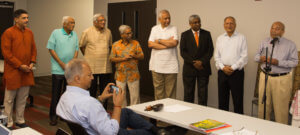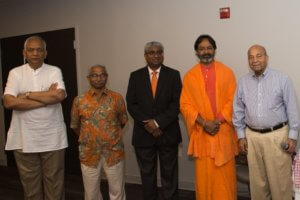Learning Outcomes
Institutional Goals
Institutional Learning Outcomes
These Institutional Learning Outcomes offer overall guidance to all Program Chairs and Directors, as well as faculty in aligning their individual program learning outcomes, and course learning outcomes, in terms of the Knowledge, Skills, Abilities, and Attitudes that Students Will Be Able To exhibit at the end of their programs of study.
Restoration
Recover and institutionalize the Hindu spiritual and intellectual paradigm of dharma.
- Inquire into knowledge systems based in Hindu thought.
- Explicate the complexity, validity, and contemporary value of Hindu dharma.
- Articulate the Hindu worldview through research, publications, and other media.
Stewardship
Take responsibility for preserving and teaching Hindu dharmic knowledge traditions for current and future generations
- Foster the institutions and traditions that honor, transmit, and advance Hindu knowledge.
- Reflect on the human condition in the light of Hindu cosmology.
- Cultivate new ideas, methods, and paradigms that enhance understanding and knowledge.
Interrogation
Critically examine Orientalist and Indological narratives on Hindu culture, civilization, and traditions
- Evaluate and interpret the received knowledge on Hinduism.
- Examine the evidence for and genealogy of ideas applied in the study of Hinduism
- Communicate the Hindu worldview through comparison, contrast, and clarification.
Service
Create new knowledge and develop Hindu dharmic solutions to problems faced by humanity and the earth.
- Formulate new knowledge and create pathways for contribution, service, leadership, and global engagement in a Hindu context.
- Develop innovative applications of Hindu dharma that address challenges facing humanity and the planet.
- Contribute to Hindu society and the larger human community.














